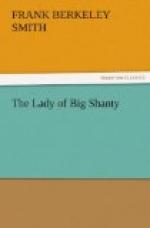Randall waited an instant and seeing Thayor’s lack of recognition blurted out in his hearty way:
“Why, it’s Holcomb, Sam; Billy Holcomb of Moose River.”
Thayor turned and formally extended his hand.
“Oh, I beg your pardon! I—” then his whole manner changed. “Why, Holcomb!” he exclaimed with delightful surprise. “Oh, I’m so glad to see you! And—er—your dear father—how is he?”
“First rate, thank you, Mr. Thayor. It seems kind of natural to see you again. Father was speaking about you the very day he left. He went on Monday to Fort Ti’ with my mother for a visit.”
“Ah, indeed!” returned Thayor, drawing up a chair beside the boy, and before even the glasses were entirely emptied the two had begun talking of the woods and all it held in store for them, the banker declaring, as he followed Randall into the dining room, that if he could arrange his business he would make a quick trip to the Lake with Holcomb as guide.
If the luncheon that followed was a surprise to the stranger from Moose River, Holcomb’s modest naturalness and innate good breeding were a revelation to Randall’s friends. This increased to positive enthusiasm when one of the actor’s massive turquoise rings struck the rim of the stranger’s wine glass, nearly spilling the contents into Holcomb’s lap, and which Holcomb’s deft touch righted with the quickness of a squirrel, before a drop left its edge, a feat of dexterity which brought from the actor in his best stage voice:
“Zounds, sir! A little more and I should have deluged you”—Holcomb answering with a smile:
“Don’t mention it. I saw it coming my way.”
Even those at the adjoining tables caught the dominating influence of the man as they watched him sitting easily in his chair listening to the stories of the Emperor of the First Empire—as Brompton was called, he having played the part—the young woodsman joining in with experiences of his own as refreshing in tone and as clear in statement as a mountain spring.
Suddenly, and apparently without anything leading up to it, and as if some haunting memory of his own had prompted it, Thayor leaned forward and touched Billy’s arm, and with a certain meaning in his voice asked:
“There is something I have wanted to ask you ever since I came, Holcomb. Tell me about that poor hide-out—the man your father fed in the woods that night. Did he get away?”
Holcomb straightened up and his face became suddenly grave. The subject was evidently a distasteful one.
“Whom do you mean, Mr. Thayor?”
“I don’t know his name; I only remember the incident, but it has haunted me ever since.”
“You mean Dinsmore.”
“What has become of him?”
“I haven’t heard lately.” He evidently did not want to discuss it further—certainly not in a crowded room full of strangers.
“But you must have learned something of him. Tell me—I want to know. I never felt so sorry for anyone in my life.”




